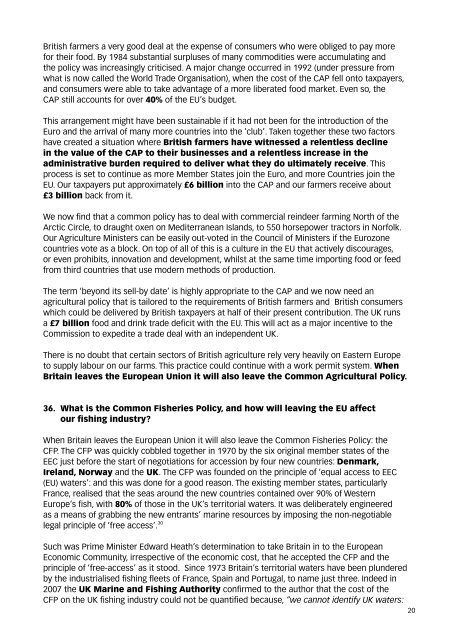EU Referendum FAQ v4
For those undecided in which way to vote in the EU referendum,this addresses the main questions and concerns people have
For those undecided in which way to vote in the EU referendum,this addresses the main questions and concerns people have
Create successful ePaper yourself
Turn your PDF publications into a flip-book with our unique Google optimized e-Paper software.
British farmers a very good deal at the expense of consumers who were obliged to pay more<br />
for their food. By 1984 substantial surpluses of many commodities were accumulating and<br />
the policy was increasingly criticised. A major change occurred in 1992 (under pressure from<br />
what is now called the World Trade Organisation), when the cost of the CAP fell onto taxpayers,<br />
and consumers were able to take advantage of a more liberated food market. Even so, the<br />
CAP still accounts for over 40% of the <strong>EU</strong>’s budget.<br />
This arrangement might have been sustainable if it had not been for the introduction of the<br />
Euro and the arrival of many more countries into the ‘club’. Taken together these two factors<br />
have created a situation where British farmers have witnessed a relentless decline<br />
in the value of the CAP to their businesses and a relentless increase in the<br />
administrative burden required to deliver what they do ultimately receive. This<br />
process is set to continue as more Member States join the Euro, and more Countries join the<br />
<strong>EU</strong>. Our taxpayers put approximately £6 billion into the CAP and our farmers receive about<br />
£3 billion back from it.<br />
We now find that a common policy has to deal with commercial reindeer farming North of the<br />
Arctic Circle, to draught oxen on Mediterranean Islands, to 550 horsepower tractors in Norfolk.<br />
Our Agriculture Ministers can be easily out-voted in the Council of Ministers if the Eurozone<br />
countries vote as a block. On top of all of this is a culture in the <strong>EU</strong> that actively discourages,<br />
or even prohibits, innovation and development, whilst at the same time importing food or feed<br />
from third countries that use modern methods of production.<br />
The term ‘beyond its sell-by date’ is highly appropriate to the CAP and we now need an<br />
agricultural policy that is tailored to the requirements of British farmers and British consumers<br />
which could be delivered by British taxpayers at half of their present contribution. The UK runs<br />
a £7 billion food and drink trade deficit with the <strong>EU</strong>. This will act as a major incentive to the<br />
Commission to expedite a trade deal with an independent UK.<br />
There is no doubt that certain sectors of British agriculture rely very heavily on Eastern Europe<br />
to supply labour on our farms. This practice could continue with a work permit system. When<br />
Britain leaves the European Union it will also leave the Common Agricultural Policy.<br />
36. What is the Common Fisheries Policy, and how will leaving the <strong>EU</strong> affect<br />
our fishing industry?<br />
When Britain leaves the European Union it will also leave the Common Fisheries Policy: the<br />
CFP. The CFP was quickly cobbled together in 1970 by the six original member states of the<br />
EEC just before the start of negotiations for accession by four new countries: Denmark,<br />
Ireland, Norway and the UK. The CFP was founded on the principle of ‘equal access to EEC<br />
(<strong>EU</strong>) waters’: and this was done for a good reason. The existing member states, particularly<br />
France, realised that the seas around the new countries contained over 90% of Western<br />
Europe’s fish, with 80% of those in the UK’s territorial waters. It was deliberately engineered<br />
as a means of grabbing the new entrants’ marine resources by imposing the non-negotiable<br />
legal principle of ‘free access’. 30<br />
Such was Prime Minister Edward Heath’s determination to take Britain in to the European<br />
Economic Community, irrespective of the economic cost, that he accepted the CFP and the<br />
principle of ‘free-access’ as it stood. Since 1973 Britain’s territorial waters have been plundered<br />
by the industrialised fishing fleets of France, Spain and Portugal, to name just three. Indeed in<br />
2007 the UK Marine and Fishing Authority confirmed to the author that the cost of the<br />
CFP on the UK fishing industry could not be quantified because, “we cannot identify UK waters:<br />
20







